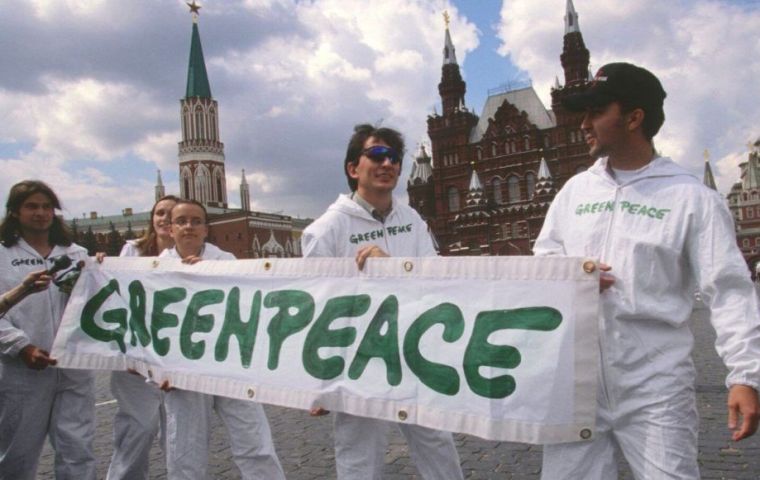MercoPress. South Atlantic News Agency
Moscow declares Greenpeace an “undesirable organization,” forcing it to close its Russian branch
 The “undesirable” or “foreign agent” labels have been applied to dozens of foreign NGOs in Russia since the classifications first came into use in 2015
The “undesirable” or “foreign agent” labels have been applied to dozens of foreign NGOs in Russia since the classifications first came into use in 2015 Russia on Friday declared the environmental group Greenpeace an “undesirable organization.” The designation criminalizes the work of organizations that bear the brand and puts employees at risk of criminal prosecution.
The “undesirable” or “foreign agent” labels have been applied to dozens of foreign NGOs in Russia since the classifications first came into use in 2015. “Undesirable” is the stronger designation of the two, leading to an effective ban in the country rather than closer monitoring by authorities.
In a statement, The Office of the General Prosecutor said Greenpeace posed “a threat to the foundations of the constitutional order and security” of the country, as the group had tried to “interfere in the internal affairs of the state.”
Since the start of Russia's military offensive in Ukraine, Greenpeace activists have been engaged in “anti-Russian propaganda” and called for Russia's economic isolation, the statement said.
Greenpeace's efforts have been “aimed at destabilizing the socio-political situation and attempting to change power in the country in an unconstitutional way,” the Office of the General Prosecutor said.
“The environmental activities of Greenpeace are in fact accompanied by the active promotion of a political position, attempts to interfere in the internal affairs of the state and are aimed at undermining its economic foundations,” the statement said.
Greenpeace categorically voiced its opposition, “This decision makes it illegal for any Greenpeace activity to continue in Russia. Therefore, the Russian branch of Greenpeace is forced to close.”
“If you think about this decision, it turns out that it is undesirable to protect nature in Russia,” the organization said. “By destroying Greenpeace for being critical of environmental issues, the country loses one of its leading experts in solving environmental problems.”
Emerging from the anti-nuclear and counterculture movement of the late 1960s, Greenpeace is one of the largest and best-known environmental organizations in the world, operating in over 50 countries, including Russia.
Russia had already launched criminal proceedings against Greenpeace activists in 2013 when they tried to scale an offshore oil platform in the Arctic Ocean, which belonged to state energy giant Gazprom, in protest against Arctic oil production.
In that incident, Russian security services boarded the group's Dutch-registered boat Arctic Sunrise and took the 30-strong crew into custody, where they were investigated for piracy.




Top Comments
Disclaimer & comment rulesCommenting for this story is now closed.
If you have a Facebook account, become a fan and comment on our Facebook Page!